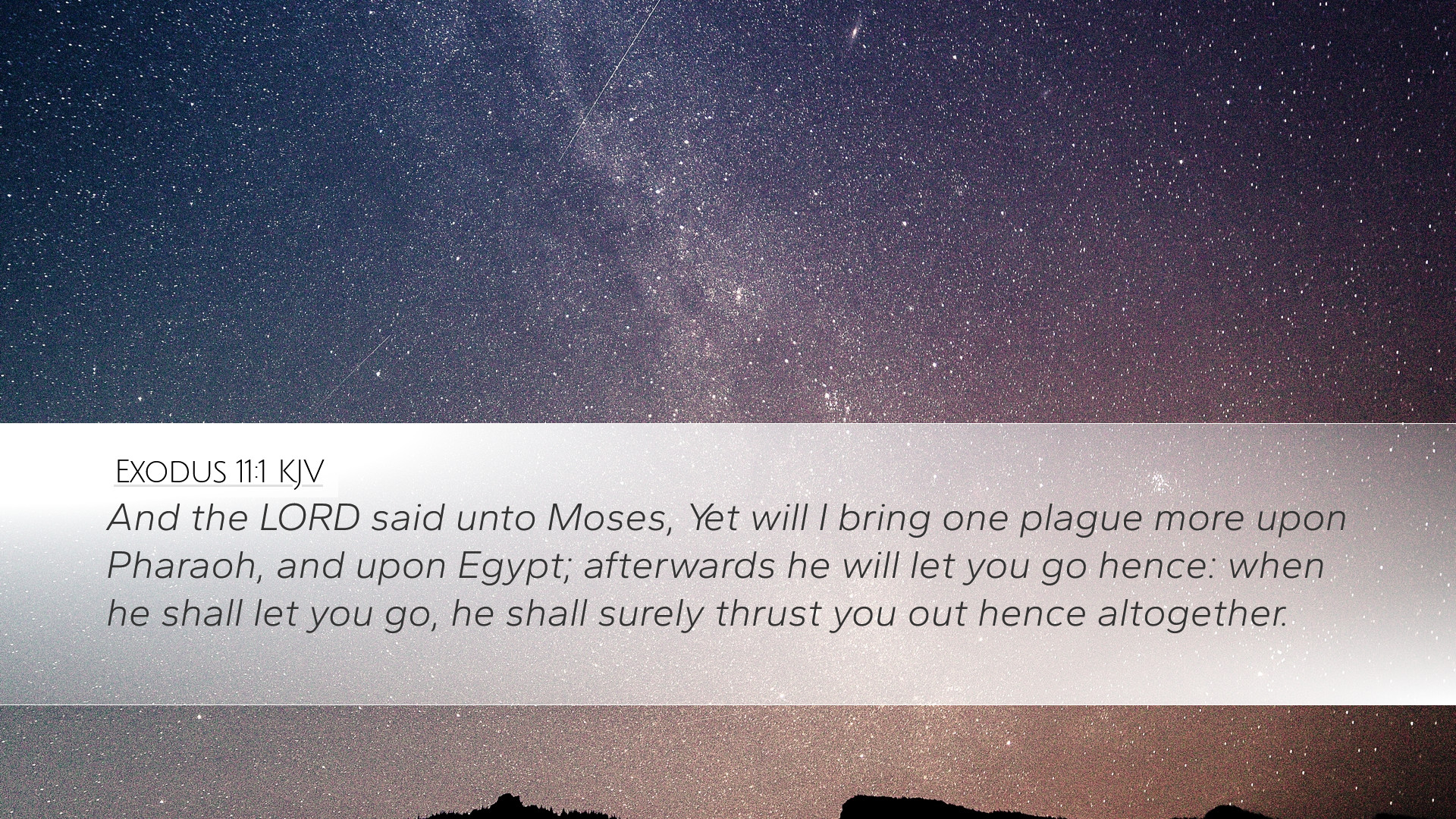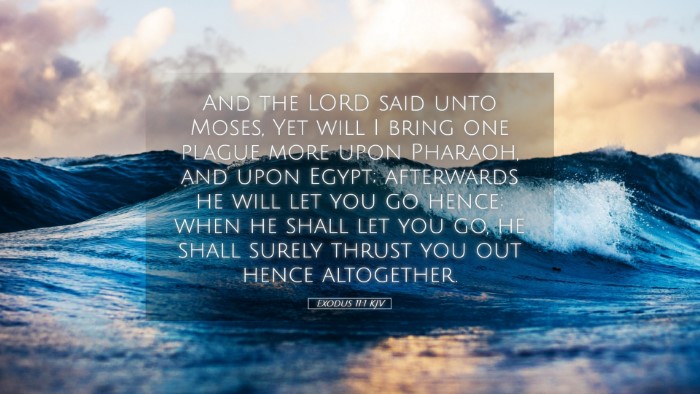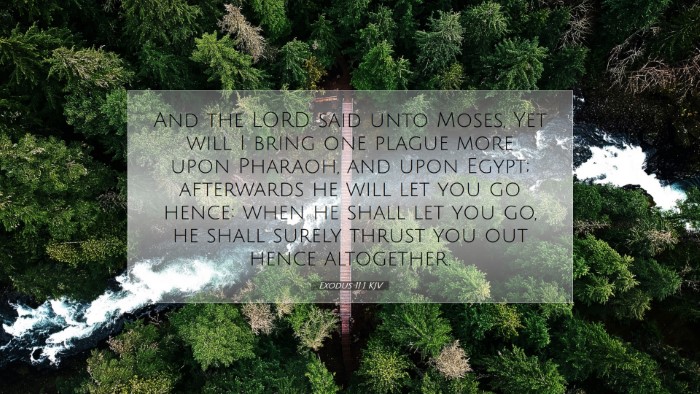Commentary on Exodus 11:1
Verse: "And the LORD said unto Moses, Yet will I bring one plague more upon Pharaoh, and upon Egypt; afterwards he will let you go hence: when he shall let you go, he shall surely thrust you out hence altogether."
Introduction
This verse serves as a pivotal moment in the narrative of the Exodus, encapsulating God's determination to deliver His people from bondage and to show His power over Pharaoh. In assembling insights from various public domain commentaries, we find a rich tapestry of theological insights that reflect the significance of God's actions and the implications for His people.
The Context of the Plagues
According to Albert Barnes, Exodus 11:1 comes at the conclusion of a series of plagues that God has unleashed upon Egypt to convince Pharaoh to release the Israelites. Each plague serves to challenge the Egyptian gods and demonstrate the supremacy of Yahweh. The significance of this final plague is that it not only foreshadows the liberation of the Israelites but also underscores Pharaoh's hardened heart.
Matthew Henry highlights that this verse indicates God’s supreme authority over the affairs of mankind. It is a declaration of both impending judgment and impending deliverance—a dual theme that runs throughout the book of Exodus. This moment signals the culmination of God's patience with Pharaoh and His commitment to fulfill His covenant with Israel.
The Nature of God's Action
Divine Sovereignty: Adam Clarke emphasizes that God's declaration of bringing “one plague more” illustrates His sovereignty in the narrative of redemption. God is not merely reacting to Pharaoh's obstinance; He is orchestrating events to fulfill His divine purpose.
The Finality of Judgment: Matthew Henry adds that the 'plague' spoken of here is not just a physical affliction but a profound spiritual statement indicating God’s judgment upon Egypt. The implication of a 'final' plague suggests that God's mercy is being exhausted, and His judgment is imminent.
Pharaoh's Response and Human Agency
Henry observes that the narrative demonstrates both the divine and human elements at play. Although Pharaoh has repeatedly hardened his heart (Exodus 7:13), God maintains His sovereignty over Pharaoh's decisions. The interplay between divine predestination and human agency is profoundly theological, inviting deep reflection among students and scholars alike.
Barnes comments on the questioning of God’s motives—if Pharaoh has consistently refused to heed the warnings of God, why is another plague needed? He posits that this serves to establish God's glory in the eyes of the Israelites and the Egyptians, emphasizing that God's plans are often beyond human comprehension.
The Themes of Deliverance and Judgment
At the heart of this verse lies the themes of deliverance and judgment. Clarke suggests that the impending plague will lead to the Israelites being thrust out; this expulsion is not merely physical but represents spiritual liberation. The act of 'thrusting out' underscores the urgency of God’s salvation plan, revealing God’s intent to not just free but to propel His people towards their destiny.
The mention of 'afterwards he will let you go' indicates God’s assurance to Moses, reinforcing the idea of divine fidelity to covenant promises. Henry argues that these words were meant to instill confidence in Moses, whose leadership was pivotal for the Israelites during these tumultuous times.
The Significance for Believers
This verse transcends its immediate context, for it holds significant implications for contemporary believers. Just as God was faithful to bring judgment upon oppressors and deliver His people, modern believers can find assurance in God’s sovereignty in their circumstances.
- Faith in Divine Redemption: Believers are encouraged to trust in God’s plan for redemption, understanding that He works through adversity to accomplish His purposes.
- The Call to Obedience: The repeated disobedience of Pharaoh serves as a warning that ignoring God’s commands can have dire consequences.
- The Assurance of Deliverance: As God assured Moses of deliverance, so too does He assure believers today of His ultimate victory over sin and evil.
Theological Implications
Exegetically, this verse is foundational for understanding God’s character. He is a God who acts, who judges, and who delivers. The implications of this text shape our understanding of God’s interaction with humanity. Scholars must grapple with concepts such as:
- The Justice of God: God's action here reflects His commitment to justice. Pharaoh's refusal to free the Israelites leads to his judgment, showcasing the principle of reaping what one sows.
- The Mercy of God: Even in judgment, there are threads of mercy—God's desire is not for destruction but for repentance and obedience.
- Historical Continuity: The Exodus narrative lays the framework for understanding subsequent themes of freedom and redemption in the Bible, culminating in the New Testament with Christ’s sacrifice.
Conclusion
Exodus 11:1 serves as a seminal point in the biblical narrative, encapsulating God’s sovereignty, judgment, and promise of deliverance. By synthesizing insights from esteemed commentators like Matthew Henry, Albert Barnes, and Adam Clarke, we can appreciate the theological richness of this passage. For pastors, students, theologians, and scholars, the verse invites further reflection on the implications of God's actions for both ancient Israel and modern believers. It reminds the faith community of God's unfailing commitment to fulfill His plans despite human resistance, encouraging a deeper trust in His redemptive work in our lives.


